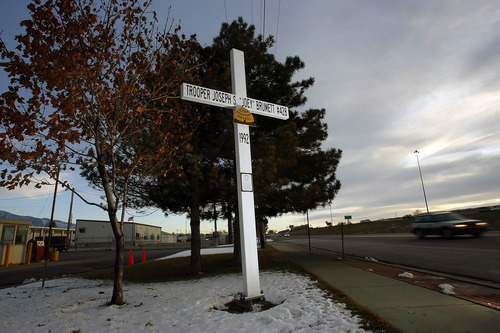This is an archived article that was published on sltrib.com in 2011, and information in the article may be outdated. It is provided only for personal research purposes and may not be reprinted.
The Utah Attorney General's Office on Wednesday requested that the U.S. Supreme Court hear arguments on whether state troopers can be memorialized with roadside crosses on state land.
"With two simple lines, the highway crosses remind us of the ultimate sacrifice made by troopers while trying to protect us," Attorney General Mark Shurtleff said in a prepared statement. "Before now, no other court has ever held that memorial crosses establish a religion. The crosses only establish a trooper died in the line of duty."
The request filed with the high court is the latest step in what has been a lengthy court battle over the display of allegedly religious imagery on public land between the Utah Highway Patrol Association and Texas-based American Atheists Inc.
In January, a federal appeals court in Denver stayed an order demanding the UHP remove crosses placed along the state's highways to commemorate troopers killed in the line of duty. The 90-day stay, approved recently by the 10th Circuit Court of Appeals, allowed attorneys for the association and UHP to try to appeal their case to the nation's highest court.
Former Texas Solicitor General Ted Cruz will represent the A.G.'s Office and association if the high court takes up the case. He will try to persuade the Supreme Court that the crosses don't establish a religion because "the passive memorials coerce no one to do anything," according to the petition filed Wednesday.
The Supreme Court hears roughly 50 cases each year out of about 10,000 that apply, according to Brian Barnard, the attorney for American Atheists.
The case began when American Atheists and three of its Utah members sued the state in 2005 for allowing the association to incorporate the UHP logo on the 12-foot-high crosses and place some of them on public property.
Fourteen crosses sit alongside state highways or on the lawn outside a UHP office.
The trooper's name, rank and badge number are printed on a 6-foot crossbar, and a large depiction of the UHP's beehive symbol hangs below where the two bars meet. The first cross was erected in 1998 on private property and 13 others were added later, most of them on public property. The memorials are privately funded and owned by the Utah Highway Patrol Association (UHPA), while the state owns the public land on which some of them sit.
"My clients believe that the Highway Patrol troopers should be honored for their sacrifice," Barnard has said. "They can be and should be honored with memorials that do not emphasize religion and do not emphasize one religion to the exclusion of all others."
The 10th Circuit Court of Appeals ruling in January to allow the stay followed a 5-4 December decision by the same court to deny a request to hear the case from the UHPA.
The Utah Highway Patrol Association had wanted the court to reverse an earlier ruling that the crosses are unconstitutional.
Dissenting judges argued that not hearing the case may send a message that federal courts are "increasingly hostile to religious symbols in the public sphere."
In the petition filed by the A.G.'s Office on Wednesday, attorneys wrote that the 10th Circuit's decision could ban crosses on highways and cemeteries in Oklahoma, Kansas, New Mexico, Colorado and Wyoming in addition to Utah. The crosses are allowed in other states, attorneys argued.
"Thus a driver traveling an interstate through several circuits might observe roadside memorials containing crosses in one state, but a mile down the road, the very same memorials will be deemed unconstitutional," the petition states.
It asks the high court to clarify tests for endorsing a religion and whether the crosses on Utah's roads establish a religion.
Barnard and American Atheists have 30 days to file a response to the A.G.'s petition. The Supreme Court will announce whether it has decided to hear the case at a later date.



